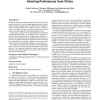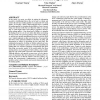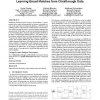499 search results - page 9 / 100 » Search Engines that Learn from Implicit Feedback |
99
Voted
CIKM
2011
Springer
13 years 11 months ago
2011
Springer
Evaluating rankers using implicit feedback, such as clicks on documents in a result list, is an increasingly popular alternative to traditional evaluation methods based on explici...
WEBI
2010
Springer
14 years 9 months ago
2010
Springer
The current search engine model considers users not trustworthy, so no tools are provided to let them specify what they are looking for or in what context, which severely limits wh...
100
Voted
KDD
2009
ACM
15 years 3 months ago
2009
ACM
1 In this article, we report our efforts in mining the information encoded as clickthrough data in the server logs to evaluate and monitor the relevance ranking quality of a commer...
84
Voted
KDD
2009
ACM
15 years 11 months ago
2009
ACM
Identifying similar keywords, known as broad matches, is an important task in online advertising that has become a standard feature on all major keyword advertising platforms. Eff...
103
click to vote
CONTEXT
2007
Springer
15 years 5 months ago
2007
Springer
Abstract. This paper presents a statistical framework based on Principal Component Analysis (PCA) for discovering the contextual factors which most strongly influence user behavio...



